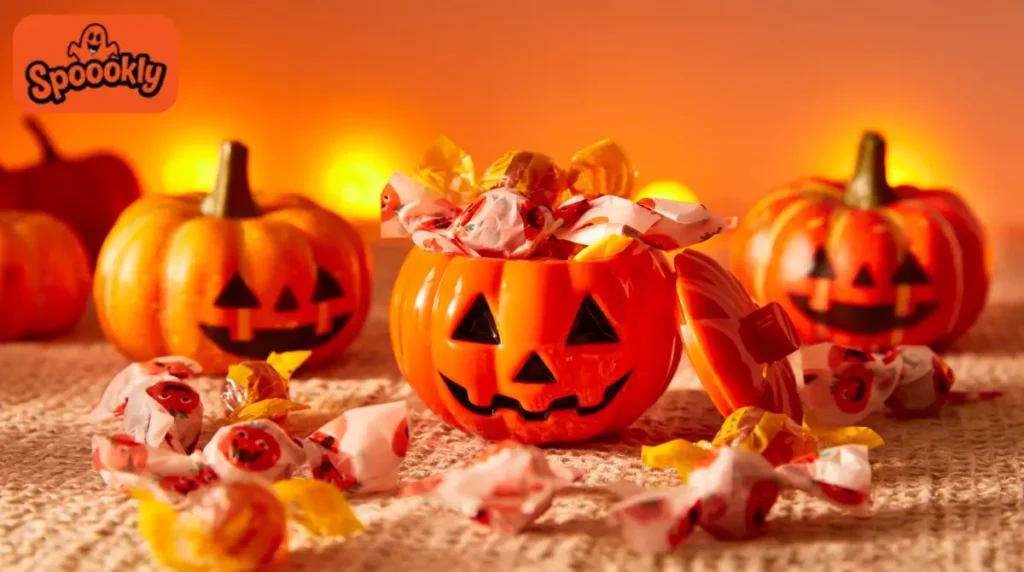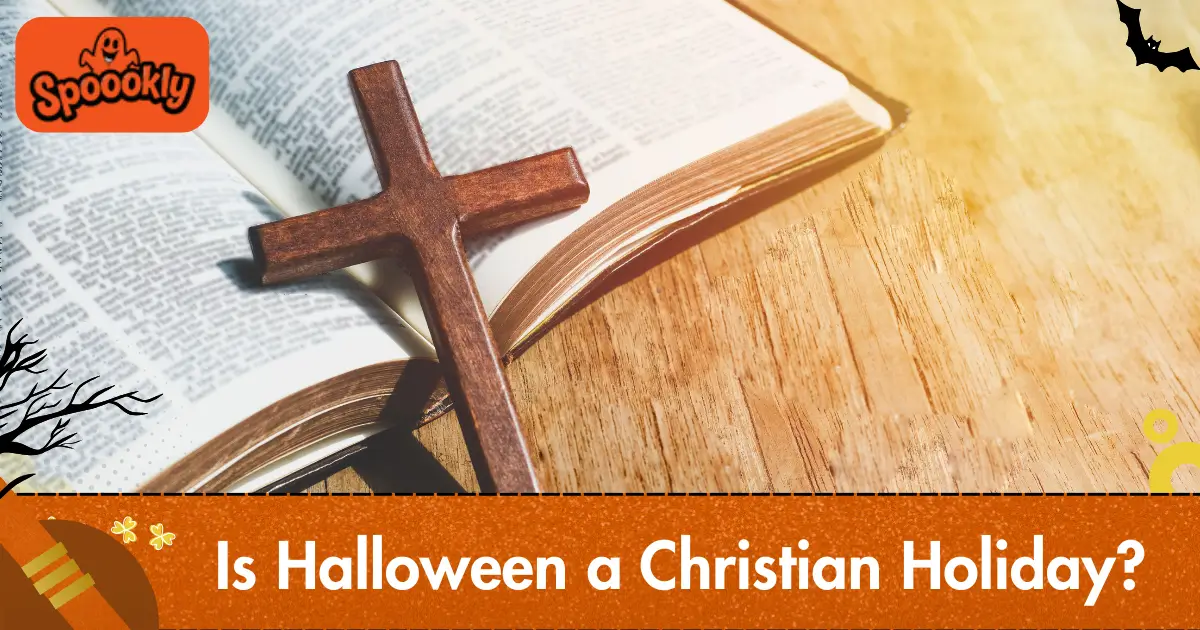People often ask me if Halloween is a Christian holiday. The short answer? Not exactly.
Halloween has strong Christian connections, but it’s also shaped by pagan traditions and modern secular culture. So, calling it purely Christian wouldn’t be accurate.
Still, the story is fascinating. From the Celtic festival of Samhain to the Christian observance of All Hallows’ Eve, and finally to today’s trick-or-treating and haunted houses, Halloween has worn many costumes of its own over the centuries.
What Do We Mean by “Christian Holiday”?
Before going further, it helps to define what we mean by a “Christian holiday.”
- A Christian holiday is usually a feast or observance officially recognized by the Church, such as Christmas or Easter.
- A cultural holiday is one that people celebrate regardless of their religion, often focusing on fun, community, or tradition.
Halloween sits awkwardly between the two. On one hand, it belongs to the Christian season of Allhallowtide. On the other hand, the way most people celebrate it today has little to do with church services or saints.
Allhallowtide: The Christian Calendar Connection
To understand Halloween’s Christian side, I need to introduce Allhallowtide. This is a three-day period in the Christian liturgical calendar:
| Date | Observance | Meaning |
|---|---|---|
| October 31 | All Hallows’ Eve (Halloween) | The vigil before All Saints’ Day |
| November 1 | All Saints’ Day | Honors all Christian saints |
| November 2 | All Souls’ Day | Prayers for all the faithful departed |
Halloween, then, is literally the eve of All Saints’ Day. The very name comes from All Hallows’ Eve. So yes, there is a clear Christian heritage here.
The Pagan Roots: Samhain and Ancient Traditions
Now, let’s talk about the other side of the coin. Long before Christianity reached the Celtic lands, the people of Ireland, Scotland, and beyond celebrated Samhain.
- Samhain marked the end of harvest and the start of winter.
- People believed the boundary between the living and the dead was thinnest at this time.
- Bonfires, costumes, and rituals were used to ward off wandering spirits.
When Christianity spread, the Church didn’t erase these customs. Instead, it often adapted them, weaving them into Christian observances. That’s partly why Halloween today looks like a mix of saints, souls, and spooky spirits.

Blend of Christian and Pagan Influences
Here’s the reality: Halloween grew from two streams that eventually met.
- Christian stream: All Hallows’ Eve as part of Allhallowtide, with vigils, prayers, and church observances.
- Pagan stream: Samhain traditions of spirits, costumes, and bonfires.
Over centuries, the two blurred together. And later, Halloween shifted again into a more secular, cultural holiday, especially in the United States.
Christian Practices Associated with Halloween
Even though most people today connect Halloween with costumes and candy, the Christian calendar has long held its own traditions for this evening.
Vigils and Church Services
In the Middle Ages, many churches held vigils on All Hallows’ Eve. People would gather for prayers, fasting, and reflection before the feast of All Saints’ Day.
Some traditions continue this today, with Christian communities holding “Vigils of All Saints.”
The Custom of Souling
One fascinating medieval practice was called souling. The idea was simple: people went door to door, offering prayers for the souls of the departed. In return, they were given small cakes, often called soul cakes.
If that sounds a bit like trick-or-treating, you’re not wrong. Historians often point to souling as one of the roots of the modern practice.
Remembering the Dead
In several Christian traditions, Halloween and the following days are a time to visit graves, light candles, and pray for the departed. This reflects the central theme of Allhallowtide: remembering those who have passed and affirming hope in eternal life.
Modern Christian Alternatives
Today, some churches prefer to focus on the positive aspects of the season. Instead of haunted houses or ghost stories, they organize “Light Parties” or community events centered around saints, faith, and family-friendly fun.
Modern Secular Halloween
Fast forward a few centuries, and Halloween looks very different in much of the world especially in the United States.
- Trick-or-Treating: Children dress up in costumes and go door to door for candy.
- Costume Parties: Adults and kids alike enjoy themed parties with spooky or funny outfits.
- Haunted Attractions: From corn mazes to full-scale haunted houses, many communities embrace the scary side.
- Decorations: Pumpkins, skeletons, and cobwebs fill homes and storefronts.
At this point, many participants have little or no awareness of Halloween’s Christian or pagan roots. For them, it’s simply a cultural celebration of the spooky season.
Christian Controversies About Halloween
Not all Christians see Halloween the same way. In fact, it’s one of the most debated holidays within the faith.
Concerns About Occult Connections
Some Christian groups reject Halloween altogether. They argue that the emphasis on witches, ghosts, demons, and dark imagery conflicts with Christian beliefs. For them, participating in Halloween can feel like endorsing the occult.
Arguments in Favor of Participation
Other Christians take a more relaxed view. They see Halloween as cultural fun, no different than a costume party with candy. Some even use it as an opportunity for community outreach, meeting neighbors and sharing kindness.
Denominational Differences
- Catholic and Orthodox Christians often emphasize the link to All Saints’ Day and All Souls’ Day.
- Protestant views vary widely, some host fall festivals as an alternative, while others fully embrace trick-or-treating.
Halloween at a Glance
| Aspect | Christian Link | Secular Practice |
|---|---|---|
| Name | All Hallows’ Eve (Christian origin) | “Halloween” as a cultural event |
| Traditions | Vigils, prayers, souling, visiting graves | Trick-or-treating, costumes, haunted houses |
| Focus | Saints, souls, remembrance | Fun, candy, spooky entertainment |
Comparisons with Other Christian Holidays
Halloween isn’t the only observance with mixed roots. Many Christian holidays absorbed older traditions as faith spread across regions.
- Christmas: Celebrated near the winter solstice, with customs like evergreen trees and Yule logs tied to pre-Christian rituals.
- Easter: Linked with Passover but also layered with spring fertility symbols, such as eggs and rabbits.
- Halloween: Positioned before All Saints’ Day but tied to Samhain’s themes of death, spirits, and seasonal change.
So, Halloween’s blend of Christian and pagan influences is not unusual. It reflects a common historical pattern: the Church often repurposed existing festivals rather than replacing them completely.
So, Is Halloween a Christian Holiday?
Here’s the honest answer: Halloween is partly Christian but not fully.
- It grew from All Hallows’ Eve, a Christian vigil before All Saints’ Day.
- Many customs like souling, vigils, prayers were practiced by Christians.
- But other elements like ghosts, costumes, and bonfires stem from pagan traditions like Samhain.
- Today, Halloween is mostly secular and cultural, with candy and costumes overshadowing religious meaning.
Whether you consider it “Christian” depends on how you celebrate. If your focus is church services and remembrance, it fits within Christian tradition. If it’s candy, costumes, and haunted houses, that’s a cultural celebration.
My Take on the Debate
Personally, I see Halloween as a hybrid holiday. When I walk through my neighborhood on October 31, I see kids laughing, pumpkins glowing, and parents chatting on the sidewalk. For me, it feels less about theology and more about community.
Still, I think it helps to know the history. When people argue whether Christians should celebrate, I always remind them: Halloween has never been just one thing. It has shifted over centuries and means different things to different people.
So, instead of asking “Is Halloween Christian?” maybe the better question is, “How do we want to celebrate it today?”
Conclusion
Halloween is not strictly a Christian holiday, but it carries Christian origins, pagan influences, and modern secular practices all at once.
- Its Christian roots lie in All Hallows’ Eve, part of the Allhallowtide season.
- Its pagan roots come from Samhain, with rituals around spirits and the harvest.
- Its modern identity is mostly cultural and fun, centered on costumes, candy, and spooky entertainment.
For Christians, the decision to celebrate or not is personal. The key is to understand the background, respect different views, and approach the holiday with awareness.
If you ask me, the mix of history makes Halloween even more interesting. It’s not just a night of candy; it’s a window into how traditions evolve and survive.
FAQs
Yes and no. It began as All Hallows’ Eve, connected to All Saints’ Day, but most modern celebrations are secular.
Traditionally, it was a vigil before All Saints’ Day, with prayers, fasting, and remembrance of the dead.
It has pagan roots in Samhain but was adapted by Christianity into All Hallows’ Eve.
Some do. Catholic and Anglican churches, for example, may hold vigils or special services on October 31.

